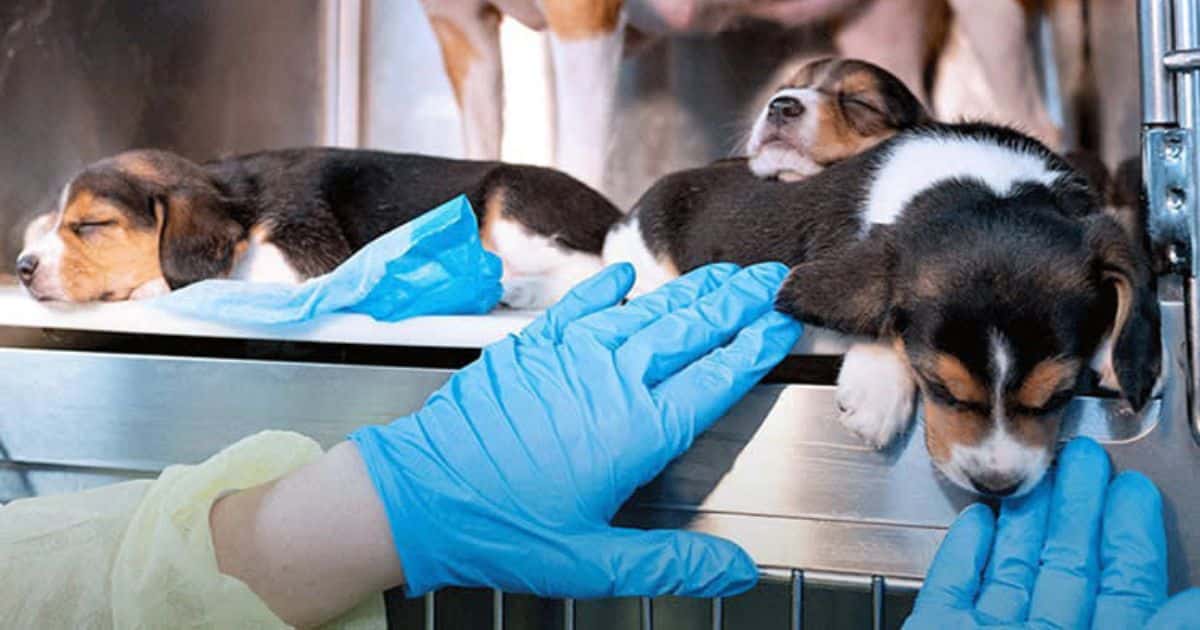While some may question the use of beagles in testing, it is important to understand the reasons behind this choice. Beagles possess unique characteristics that make them ideal for medical research, and their historical role in testing cannot be overlooked.
However, ethical concerns surrounding beagle testing have prompted the development of regulatory guidelines and exploration of alternative methods. This article explores the reasons behind testing on beagles, the ethical considerations, and the future of this practice, all with a focus on promoting ethical practices in animal testing.
Key Takeaways
- Beagles are preferred as test subjects due to their small to medium size, friendly temperament, well-mapped genome, and versatility in experiments.
- Ethical concerns arise from the pain and suffering beagles experience during testing, as well as the lack of transparency and accountability in the industry.
- Scientific advancements have contributed to the development and continuation of beagle testing, but also led to the exploration of alternative methods.
- Alternative methods to beagle testing include in vitro testing, computer modeling, simulation, and human volunteers for clinical studies, which can minimize animal use and provide more humane and accurate results.
Beagles: A Popular Choice for Testing

Beagles are often chosen as a preferred breed for Test on Beagles due to their unique combination of size, temperament, and genetic characteristics. Their small to medium size makes them easy to handle and house in laboratory settings.
Beagles are known for their friendly and docile nature, which allows researchers to work with them safely. Additionally, their genetic makeup, including a well-mapped genome, makes them valuable in studying various diseases and medical conditions. Now, let us delve into the historical background of beagle testing.
Beagle Testing: Historical Background
The historical background of Beagle testing encompasses several key points that need to be examined. Firstly, there are ethical concerns surrounding the use of Beagles in testing due to their docile nature and close bond with humans. Secondly, scientific advancements have played a significant role in the development and continuation of Beagle testing, with researchers relying on these animals for various experiments.
Lastly, it is important to explore the alternatives to Beagle testing that have emerged in recent years, as society seeks more humane and effective methods of scientific research.
Ethical Concerns in Beagle Testing
Numerous ethical concerns arise in the field of beagle testing, particularly when considering the historical background of this practice. These concerns include:
- Animal welfare: Beagles are often subjected to painful and invasive procedures, causing unnecessary suffering.
- Lack of alternative methods: Despite advancements in technology, beagle testing continues to be relied upon, even when alternative methods are available.
- Transparency and accountability: The lack of transparency surrounding beagle testing makes it difficult to hold researchers and institutions accountable for their actions.
These ethical concerns highlight the need for a reevaluation of beagle testing practices and a shift towards more humane and ethical alternatives.
Scientific Advancements and Beagle Testing
With the advent of scientific advancements, particularly in the field of medical research, the historical background of beagle testing has become increasingly significant. Beagles have been used extensively in research due to their docile nature, small size, and genetic uniformity.
Since the early 20th century, beagles have played a crucial role in advancing our understanding of various diseases and developing life-saving medications. However, the ethical concerns surrounding their use in testing continue to be a topic of debate.
| Year | Milestone | Significance |
|---|---|---|
| 1959 | Beagles became the dog breed of choice for pharmaceutical testing | Their small size and uniform genetic makeup made them ideal for research |
| 1966 | Publication of Russell and Burch’s book, “The Principles of Humane Experimental Technique” | Introduced the concept of the Three Rs (Replacement, Reduction, Refinement) to minimize animal suffering |
| 1970s | Increased public awareness and scrutiny of animal testing | Led to the establishment of regulatory agencies and guidelines for animal welfare |
| Present | Ongoing efforts to develop alternative testing methods | Scientists are actively working towards reducing and replacing animal testing with more humane and accurate alternatives |
Alternatives to Beagle Testing
Exploring alternatives to beagle testing is an imperative step in addressing ethical concerns and advancing scientific research. There are several promising alternatives that can provide reliable data without the need for animal testing. These include in vitro testing methods, such as tissue cultures and cell-based assays, computer modeling and simulation, and the use of human volunteers for clinical studies.
By embracing these alternatives, we can minimize the use of animals in research while still achieving meaningful results. In considering the unique characteristics of beagles, it is important to understand the ethical implications of subjecting them to testing procedures.
The Unique Characteristics of Beagles
Beagles possess distinctive breed traits that make them well-suited for certain types of testing. Their keen sense of smell, intelligence, and docile nature make them popular subjects for studies related to olfactory and cognitive research.
However, their strong hunting instincts and tendency to follow scents can also present challenges in laboratory settings. Additionally, beagles are prone to certain health issues, such as ear infections and obesity, which researchers must consider when conducting experiments to ensure the welfare of the animals.
Beagle Breed Traits
The distinct characteristics of the Beagle breed make them an intriguing subject for research and testing purposes. Beagles are known for their keen sense of smell, which is 40 times more powerful than that of humans. Their small size and friendly nature allow them to easily interact with humans and adapt to different environments. Additionally, Beagles have a strong sense of loyalty and are highly sociable, making them ideal companions for both humans and other animals.
Behavioral Quirks of Beagles

With their distinct behavioral quirks, beagles offer a unique perspective for research and testing purposes. National Beagle Day celebrates these remarkable dogs, known for their keen sense of smell, which makes them excellent scent detection dogs. They are highly curious and have a strong instinct to follow scents, often leading to their involvement in search and rescue missions.
Beagles are also known for their friendly and sociable nature, making them suitable for socialization studies. Their small size and adaptability add to their value as research subjects.
| Behavioral Quirk | Description | Research Applications |
|---|---|---|
| Keen sense of smell | Beagles have a superior sense of smell compared to other dog breeds, making them ideal for scent detection research. | – Studying olfactory abilities<br>- Developing new methods for scent detection<br>- Testing the effectiveness of various scents |
| Curiosity and scent-tracking instincts | Beagles have a natural inclination to follow scents, making them valuable in search and rescue operations. | – Evaluating search and rescue techniques<br>- Training and assessing scent-tracking abilities<br>- Developing tools and technologies for search and rescue missions |
| Friendly and sociable nature | Beagles are known for their friendly temperament and love for social interaction. | – Studying social behavior and interaction<br>- Assessing the impact of socialization on behavior and well-being<br>- Evaluating the effectiveness of socialization programs |
Health Issues in Beagles
What are the unique health issues associated with this breed?
- Beagles are prone to obesity due to their love for food and lack of self-control. This can lead to various health problems such as diabetes, heart disease, and joint issues.
- They are also susceptible to ear infections due to their long, droopy ears that can trap moisture and bacteria.
- Beagles are known to have a higher risk of developing epilepsy compared to other breeds.
It is important for Beagle owners to be aware of these health issues and take necessary precautions to ensure their pet’s well-being.
Beagles and Their Role in Medical Research
Why do beagles play a significant role in medical research? Beagles are often chosen as research subjects due to their docile nature, small size, and ease of handling. Their size makes them suitable for various experiments, and their friendly temperament allows researchers to interact with them easily.
Beagles also have a similar physiology to humans, making them valuable for studying diseases and developing treatments. While some may question the ethics of animal testing, beagles’ contribution to medical advancements cannot be denied.
Ethical Concerns Surrounding Beagle Testing
There are ethical concerns surrounding the testing of beagles in medical research. These concerns include:
- Animal welfare: Beagles are known for their friendly and docile nature, making them vulnerable to the stress and suffering caused by testing procedures.
- Alternatives to animal testing: With advancements in technology, there are now alternative methods available that could reduce the need for animal testing.
- Transparency and accountability: Some argue that there is a lack of transparency in the use of beagles for testing, making it difficult for the public to fully understand the ethical implications.
These concerns raise important questions about the ethical justification for using beagles in medical research. However, regulatory guidelines aim to address these concerns and ensure the welfare of animals involved in testing.
Regulatory Guidelines for Beagle Testing
To ensure the ethical treatment and welfare of beagles used in medical research, regulatory guidelines have been established. These guidelines aim to protect the animals from unnecessary harm and ensure their well-being throughout the testing process.
They set standards for the housing, care, and handling of beagles, as well as the procedures and protocols that must be followed during testing. By adhering to these guidelines, researchers aim to minimize any potential suffering and ensure that the benefits of testing outweigh the ethical concerns.
Alternatives to Beagle Testing: Pros and Cons
One potential alternative to beagle testing is the use of in vitro models, which offer advantages and drawbacks.
- Advantages:
- In vitro models provide a controlled environment, allowing researchers to study specific factors without interference from other variables.
- They are cost-effective and time-efficient compared to animal testing.
- In vitro models can be used to test a wide range of substances, reducing the need for animal experimentation.
- Drawbacks:
- In vitro models do not fully replicate the complexity of a living organism, limiting their ability to accurately predict real-life responses.
- Results obtained from in vitro models may not always translate to the same effects in humans.
- Ethical concerns arise when using human cells or tissues in in vitro models.
The Future of Beagle Testing
The future of beagle testing is poised for transformation as advancements in alternative methods gain momentum. With increasing public awareness and ethical concerns surrounding animal testing, there is a growing demand for more humane and reliable alternatives. Scientists are exploring innovative technologies such as in vitro testing, computer simulations, and organ-on-a-chip models to replace the use of beagles in experiments.
These advancements offer hope for a future where animals are no longer subjected to unnecessary suffering in the name of scientific research. Transitioning towards these alternatives is a crucial step in promoting ethical practices in animal testing.
Promoting Ethical Practices in Animal Testing

Researchers are actively working towards promoting ethical practices in animal testing by exploring alternative methods that prioritize the well-being of animals. To achieve this, they are implementing the following strategies:
- In vitro testing: Scientists are developing sophisticated laboratory techniques that allow them to study the effects of substances on cells, tissues, and organs without the need for animal subjects.
- Microdosing: This technique involves administering tiny amounts of a substance to humans, allowing researchers to gather valuable information about its effects without harming animals.
- Computer modeling: Advanced computer models are being used to simulate the effects of substances on biological systems, reducing the need for animal testing.
Frequently Asked Questions
What Are Some Other Dog Breeds Commonly Used in Testing Besides Beagles?
Other dog breeds commonly used in testing include Labrador Retrievers, Golden Retrievers, and Beagles. These breeds are chosen for their size, temperament, and genetic characteristics, which make them suitable for a range of research purposes.
How Long Has Beagle Testing Been Practiced in the Field of Medical Research?
Beagle testing has been practiced in the field of medical research for several decades. This method, although controversial, has been utilized due to the breed’s size, temperament, and genetic similarities to humans.
Are There Specific Traits or Qualities of Beagles That Make Them More Suitable for Testing Compared to Other Breeds?
Beagles are commonly used in testing due to their docile nature, small size, and ease of handling. Their high tolerance to discomfort and adaptability to various environments also make them suitable for medical research.
How Do Researchers Ensure the Well-Being and Quality of Life for Beagles Used in Testing?
To ensure the well-being and quality of life for beagles used in testing, researchers adhere to ethical guidelines and employ proper care protocols. This includes providing a suitable environment, regular veterinary check-ups, proper nutrition, and socialization opportunities.
What Steps Are Being Taken to Reduce or Eliminate the Need for Animal Testing, Specifically Using Beagles, in the Future?
Efforts are underway to reduce or eliminate the need for animal testing, particularly involving beagles. Researchers are exploring alternative methods like in vitro testing, computer modeling, and human tissue cultures to ensure ethical practices and animal welfare.
Conclusion
In conclusion, the use of beagles in testing has a long historical background and is primarily due to their unique characteristics that make them suitable for medical research. However, ethical concerns have arisen regarding this practice. Regulatory guidelines aim to ensure the welfare of these animals, but alternatives to beagle testing should be explored. The future of beagle testing lies in promoting ethical practices in animal testing, prioritizing the well-being and rights of all living beings involved.







